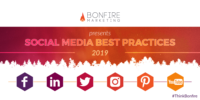Planning makes perfect! That’s the phrase, right? Either way, planning ahead gives your social media marketing a leg up. Spending time to craft thoughtful and creative messaging will provide better customer experiences and give your brand a boost in the digital realm. Ready to get started? Read on, and discover our guide to social media success.
1. Identify your audience
Before creating or launching any social media promotion, consider your audience. Take a look at your current Facebook fans and begin building personas for your audience. When you understand who you’re currently reaching and who you’d ideally like to reach, your content will be more effective.
This is also an opportunity to identify which social media platforms your brand needs content for. Twitter, Facebook, Instagram, Pinterest, the list goes on and on! If your product is visual or you’re creating a lifestyle brand, Instagram will be key to your social strategy. If the brand is focused on B2B, LinkedIn is more likely to target the correct demographic. Ultimately, understanding your audience is the first step to mastering your social media planning.
2. Identify your goals
Determining your brand’s goals is important for measuring progress and success. If your brand is interested in increased awareness, don’t focus on consideration level marketing. With goals in place, you can identify key performance indicators (KPIs). Consider focusing on engagement rate, shares, views, or conversions. If social ads are your focus, keep click-throughs in mind.
Be sure to measure your social metrics in relation to your other marketing channels like email campaigns and AdWords. All channels work together, so consider these guides when choosing KPIs:
- Our content marketing metrics guide will help you identify specific metrics for social media.
- Our guide to email marketing metrics will help you track conversions and the effectiveness of your email marketing campaigns.
- Our SEO KPI measurement guide will help you identify and monitor KPIs for optimizing your search engine rankings.
3. Create a content plan
Now that the prep work is done, you can start creating a content calendar! You can use a template as a base to get going and map out your upcoming content. Planning social media posts in advance will ensure consistency and quality of content. When you regularly post thoughtful and creative posts, your audience’s experience with the brand is improved.
With the persona research done, you’ve already identified social channels, but depending on your budget and audience, your frequency will vary. In your social calendars, test different post types and posting frequency for each platform. When you try new things, you can evaluate their performance later and zero in on strategies that work best for your brand.
First, though, start brainstorming content with a few tips from our team:
- Look at what’s worked. If you’ve created social media campaigns in the past, see what worked before. Use it as a jumping off point for new brainstorms.
- Look to competitors. Find brands online creating interesting content and use it as inspiration for your infographics, videos, custom photography, and more.
- What’s trending? Look to trending topics and hashtags for content inspiration. Trends provide a great opportunity to increase organic reach.
- Optimize! Use our social media best practices to make the most of every social post.
4. Post, test, and evaluate
Now that your social content is planned, it’s time to post it and evaluate the results. Constantly measuring and evaluating your results will ensure your social channels are optimized and that your audience experience is great. If particular post types don’t perform well, try altering them or removing them entirely from future calendars. Not sure what about a piece of content is performing well? Run an A/B test and evaluate the results! Social media is constantly changing, so keeping up on new trends and responding to them is key.
With all these insights, your brand is set up for social media success!
More Resources:
More Content
Fundamentals of Effective Marketing Reporting
Effective marketing isn’t based on hunches. That shouldn’t come as a shock to anyone, since we hear all the time about the importance of making data-informed decisions, regardless of what
5 Best Practices for a Hardware Product Launch
If you work in technology, you’re familiar with the hype around a new product launch. Hardware product launches these days are made for the digital world, and that means throwing
The Ultimate Social Media Best Practices 2019 [Infographic]
Jump ahead to best practices for: Facebook Posts Facebook Paid Posts LinkedIn Posts LinkedIn Sponsored Content Pinterest Pins Pinterest Promoted Pins YouTube Videos When I began my work with Bonfire,




Leave A Comment